#South African English
Explore tagged Tumblr posts
Text
the new Snapscan marketplace has the most incredible wordplay in the name (not promoting them I think it's somehow ai-driven, blegh, but the pun is fantastic. despite their poor IPA)

it's called S'market, which obviously stands for Snapscan Market
South African English is a non-rhotic dialect, like British RP for example, so we pronounce "market" as /mɑ:kɪt/. the name S'market thus sounds like the phrase "smaak it"
smaak /smɑ:k/ is an Afrikaans verb meaning "to taste", but intransitively as in "the food tastes delicious" = die kos smaak lekker. for the transitive meaning Afrikaans has the verb proe, so like "I taste the food" = "ek proe die kos".
However. in South African slang, we use the verb smaak transitively to mean "really enjoy, like" or "to crave". for example : "I smaak your shoes" = I love your shoes. or the title of the 2007 song by Jeremy Mansfield "I smaak you stukkend", basically "I like you a lot" or more literally "I'm crushing on you so hard you'll break." the idiom to "smaak [someone/something] stukkend" was further popularised and cemented in South African pop culture by the 2008 teen film Bakgat! (to be clear : I'm doing a lexicography and do not necessarily endorse or recommend the song or the film. I doubt they've aged well but don't particularly feel like checking now. point is they were popular back then, and the phrase has out-survived the original context)
so yeah that's the pun. I smaak it = I love it, I want it, I desire it. a pretty apt name for a marketplace. gosh it truly ruins a joke to explain it but idk how else to have shared this
7 notes
·
View notes
Text
I always forget that the other dialects of English don't do the same weirdness with the word 'now' that South African English does, and the amount of times I've had to go back and edit my writing just because of that is inordinate.
Here's an example of what I mean:
"I'll do it now," - I'm just finishing with something, I'll do it sometime in the next few minutes.
"I'll do it just now," - I'll do it sometime in the next half an hour to an hour.
"I'll do it now-now," - I'll do it in a few hours.
"I did it now-now," - I did it sometime in the last few hours
"I'll do it right now," - I'm dropping everything to do this immediately.
4 notes
·
View notes
Text

The Eastern Cataracts of the Victoria Falls by Thomas Baines
#thomas baines#art#victoria falls#double rainbow#rainbow#rainbows#waterfalls#waterfall#africa#zambezi river#river zambezi#rhodesia#zimbabwe#zambia#south africa#european#explorer#british#english#james chapman#south african#african#zambezi expedition#explorers#exploration#cataracts#cataract#guns
695 notes
·
View notes
Text
Time Travel Question 50: Early Modernish and Earlier 4
These Questions are the result of suggestions a the previous iteration.This category may include suggestions made too late to fall into the correct earlier time grouping. In some cases a culture lasted a really long time and I grouped them by whether it was likely the later or earlier grouping made the most sense with the information I had. (Invention ofs tend to fall in an earlier grouping if it's still open. Ones that imply height of or just before something tend to get grouped later, but not always. Sometimes I'll split two different things from the same culture into different polls because they involve separate research goals or the like).
Please add new suggestions below if you have them for future consideration. All cultures and time periods welcome.
#Time Travel#Early Modern#Queen Nzinga#Ndongo#Matamba#Queen Nzinga of Ndongo and Matamba#African History#Women's History#Women in History#Edward IV#English History#Medieval History#Middle Ages#Susquehannocks#Indigenous history#North American Indigenous History#North American History#Iroquois#Five Nations#South American History#Aotearoa#New Zealand#Mayans#Knitting#Mansa Musa#Indigenous History#The Americas#1400#History of Food#South American History
248 notes
·
View notes
Text
secret third option : "aant/ahnt" i.e. [ɑ:nt] rhymes with "aren't" in a non-rhotic accent or the French city "Nantes"
"ant" would be [ænt] rhymes with "pant" or "rant"
"awnt" would be [o̞:nt] rhymes with "haunt"
#english#south african english#I mean what truly baffles me about this#is that even of you're genuinely unaware of other accents and pronunciations#is it not good practice to add an 'other' option ???#especially if you're only using 2 of the 12 available slots#and to be clear I've not voted because neither of those options is correct for me
21K notes
·
View notes
Text

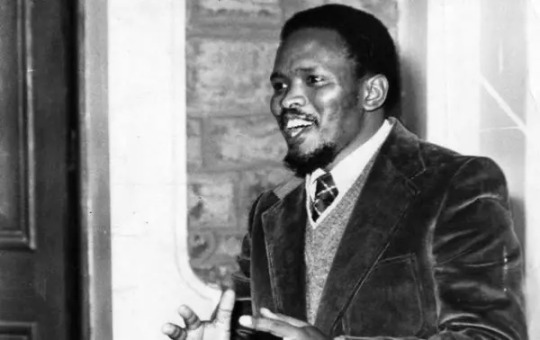
Stephen Bantu Biko
Stephen Biko was born in 1946, in King William's Town in the Eastern Cape, South Africa. As a medical student at the University of Natal, he was involved with the National Union of South African Students (NUSAS) and went on to found the South African Students' Association (SASO).
At a time when the African National Congress and Pan-Africanist Congress were banned by the government, SASO filled the political vacuum by evolving into the Black Consciousness Movement.
In 1972 Biko was expelled from the university, and the following year he was banned by the authorities. Despite this, he played a key role in organizing the protests that culminated in the Soweto Uprising of 1976.
He helped to unite over 70 black consciousness groups which helped to develop the Black Consciousness Movement and help advance the liberation struggle, building a vanguard party.
He was banned between 1975 and 1977 and caught, arrested and in police detention September 12, 1977 after being beaten mercilessly, he slipped into a coma to his death.
Although Biko never lived to write his memoirs, he left behind some revealing documents. African Lives includes a portion of an interview Biko gave to an American businessman a few months before he was detained and beaten to death.
He was assassinated because he represented power of African unity and the black consciousness and courage of the people. Long live the life, consciousness, courage, contributions and legacy of Stephen Bantu Biko. May his spirit live and manifest in future generations.
•••
Stephen Bantu Biko
Stephen Biko nació en 1946 en la ciudad del Rey William en la Provincia del Cabo, Sudáfrica. Cómo estudiante de medicina en la Universidad de Natal, estuvo involucrado con la Unión Nacional de Estudiantes Sudafricanos (NUSAS) y luego fundó la Organización de Estudiantes Sudafricanos (SASO).
En un tiempo en el cual el Congreso Nacional Africano y el Congreso Pan-Africanista fueron prohibidos por el gobierno, SASO llenó la aspiradora política al evolucionar y convertirse en el Movimiento de Conciencia Negra.
En 1972, Biko fue expulsado de la universidad y al año siguiente fue exiliado por las autoridades. A pesar de esto, él jugó un rol importante en organizar las protestas que llevaron a la Rebelión de Soweto de 1976.
Ayudó a unir alrededor de setenta grupos de conciencia negra, lo cual ayudó a desarrollar el Movimiento de Conciencia Negra y ayudó con los avances para la lucha por la liberación, así creando un partido vanguardista.
Fue exiliado desde el año 1975 hasta 1977 y el 12 de septiembre de 1977, fue arrestando y puesto bajo detención policial. Luego de haber sido atacado sin piedad alguna, cayó en coma y falleció.
Aunque Biko nunca vivió lo suficiente para escribir su autobiografía, dejó unos documentos muy reveladores. Vidas Africanas incluye una porción de una entrevista que Biko le dio a un empresario estadounidense unos meses antes de que fuese detenido y golpeado hasta morir.
Fue asesinado porque él representaba el poder de la unidad africana, la conciencia negra y la valentía del pueblo. Larga vida a la vida, al conocimiento, a la valentía, contribuciones y legado de Stephen Bantu Biko. Que su espíritu viva y se manifieste en futuras generaciones.
#blacklivesmatter#blacklivesalwaysmatter#blackhistory#english#spanish#history#africanhistory365#africanhistory#african history#historia africana#africanheritage#south africa#africa#education#black history is everybody's history#black history is world history#historyfacts#soweto#black liberation#protest#university#historia#knowyourhistory#heritage#hero#black history#espanol#share#blackhistorymonth#blackpeoplematter
119 notes
·
View notes
Note
hi, i haven't read the iliad and the odyssey but want to - do u have a specific translation you recommend? the emily wilson one has been going around bc, y'know, first female translator of the iliad and odyssey into english, but i was wondering on if you had Thoughts
Hi anon! Sorry for the somewhat late response and I'm glad you trust me with recommendations! Full, disclosure, I am somewhat of a traditionalist when it comes to translations of the source text of the Iliad + Odyssey combo wombo, which means I tend to prefer closeness in literal verbiage over interpretation of the poetic form of these epics - for that reason, my personal preferred versions of the Odyssey and Iliad both are Robert Fitzgerald's. Because both of these translations (and his Aeneid!) were done some 50+ years ago (63 for his original Odyssey tl, 50 flat for his Iliad and 40 for his Aeneid) the English itself can be a bit difficult to read and the syntax can get confusing in a lot of places, so despite my personal preferences, I wouldn't recommend it for someone who is looking to experience the Iliad + Odyssey for the very first time.
For an absolute beginner, someone who has tried to read one or both of these epics but couldn't get into it or someone who has a lot of difficulty with concentrating on poetry or long, winding bits of prose, I fully and wholeheartedly recommend Wilson's translation! See, the genius of Emily Wilson's Iliad + Odyssey isn't that she's a woman who's translated these classics, it's that she's a poet who's adapted the greek traditional poetic form of dactylic hexameter into the english traditional poetic form of iambic pentameter. That alone goes a very very long way to making these poems feel more digestible and approachable - iambic pentameter is simply extremely comfortable and natural for native english speakers' brains and the general briskness of her verbiage helps a lot in getting through a lot of the problem books that people usually drop the Iliad or Odyssey in like Book 2 of the Iliad or Book 4 of the Odyssey. I think it's a wonderful starting point that allows people to familiarise themselves with the source text before deciding if they want to dig deeper - personally, researching Wilson's translation choices alone is a massive rabbit hole that is worth getting into LOL.
The happy medium between Fitzgerald's somewhat archaic but precise syntax and Wilson's comfortable meter but occasionally less detailled account is Robert Fagles' Iliad + Odyssey. Now, full disclosure, I detest how Fagles handles epithets in both of his versions, I think they're far too subtle which is something he himself has talked at length about in his translation notes, but for everything else - I'd consider his translations the most well rounded of english adaptations of this text in recent memory. They're accurate but written in plain English, they're descriptive and detailled without sacrificing a comfortable meter and, perhaps most importantly, they're very accessible for native english speaking audiences to approach and interact with. I've annotated my Fagles' volumes of these books to heaven and back because I'm deeply interested in a lot of the translation decisions made, but I also have to specifically compliment his ability to capture nuance in the characters' of these poems in a way I don't often see. He managed to adapt the ambivalence of ancient greek morality in a way I scarcely see and that probably has a hand in why I keep coming back to his translations.
Now, I know this wasn't much of a direct recommendation but as I do not know you personally, dear anon, I can't much make a direct recommendation to a version that would best appeal to your style of reading. Ideally, I'd recommend that you read and enjoy all three! But, presuming that you are a normal person, I suggest picking which one is most applicable for you. I hope this helps! 🥰
#ginger answers asks#greek mythology#the iliad#the odyssey#okay so now that I'm not recommending stuff I also highly highly HIGHLY suggest Stephen Mitchell's#Fuck accuracy and nuance and all that shit if you just want a good read without care for the academic side of things#Stephen Mitchell's Iliad and Odyssey kick SO much fucking ass#I prefer Fitzgerald's for the busywork of cross-checking and cross-referencing and so it's the version I get the most use out of#But Mitchell's Iliad specifically is vivid and gorgeous in a way I cannot really explain#It's not grounded in poetic or translationary preferences either - I'm just in love with the way he describes specifically the gods#and their work#Most translations and indeed most off-prose adaptations are extremely concerned with the human players of these epics#And so are a bit more ambivalent with the gods - but Mitchell really goes the extra mile to bring them to life#Ugh I would be lying if I said Mitchell's Apollo doesn't live rent free in my mind mmm#Other translations I really like are Stanley Lombardo's (1997) Thomas Clark's (1855) and Smith and Miller (1944)#Really fun ones that are slightly insane in a more modern context (but that I also love) are Pope's (1715) and Richard Whitaker (2012)#Whitaker's especially is remarkable because it's a South African-english translation#Again I can't really talk about this stuff because the ask was specifically for recommendations#But there are SO many translations and adaptations of these two epics and while yes I have also contributed to the problem by recommending#three very popular versions - they are alas incredibly popular for a reason#Maybe sometime I'll do a listing of my favourite Iliad/Odyssey tls that have nothing to do with academic merit and instead are rated#entirely on how much I enjoy reading them as books/stories LMAO
34 notes
·
View notes
Text

Hannah van der Westhuysen
Gender: Non binary (they/them)
Sexuality: Queer
DOB: 26 August 1995
Ethnicity: English, South African
Occupation: Actor
#Hannah van der Westhuysen#enby#lgbt#lgbtq#queerness#non binary#queer#1995#white#english#south african#african#actor
108 notes
·
View notes
Text
The funny realisation I had the other day is that South African English as it's spoken informally is probably borderline incomprehensible to foreigners. This might also be because our "English" slang mixes together multiple different languages to varying degrees based on the area.
Some examples with a standard English interpretation:
"Shot, bru, we mos chila lekker early today, nê?" - Hey, dude! We get to go home nice and early today, right?
"Hai bathung! It's mos a sho't left at the robot," - Seriously man, you just need to hang a left at the traffic light, I thought you knew this.
"You must ask her if she's game for a jol," - You should go ask if she's down for a party.
"Aikôna! Voetsek wena!" - No, man! Bugger off, you little shit!
"Simon's the fundi, go ask him," - Simon's the expert, go ask him.
"I'm sick, sat, and gatvol for that bliksem," - I'm sick, tired and up to here with that bastard's crap.
"Eish," - Well that's unfortunate.
"Hayibo, go get some muthi. Just now it gets worse," - Jeez, go get some medicine before it gets any worse.
"I smaak me some biltong," - I like biltong quite a lot [For anyone who's never had biltong, it's like jerky if it didn't taste like factory cast-off]
"Taxi!" - *yelled when someone is drunk enough that they spill their drink.*
"Aitsa! Monkey's wedding," - Will you look at that, it's a sunshower.
"Howzit, soutie?" - Hi, Englishman/Englishwoman. [Referring to someone who primarily speaks English, not someone from England]
"It's kiff, ou," - it's going well, dude.
"Awê china!" - Hello my friend!
"These church aunties skinner lekker," - These ladies from the church gossip a lot
0 notes
Text
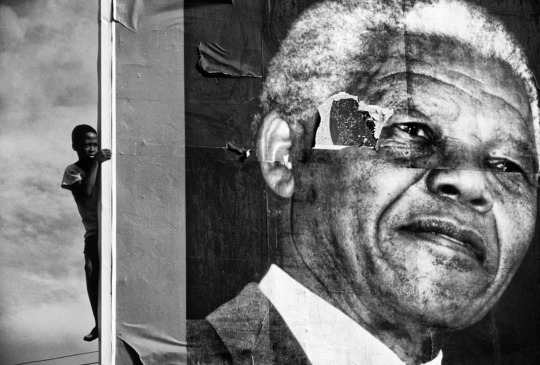
ANC rally, South Africa, Tom Stoddart, 1994
#photography#vintage photography#vintage#black and white photography#tom stoddart#1990s#1994#south africa#nelson mandela#english#british#african national congress
75 notes
·
View notes
Text




"I repeat you" / "Ik herhaal je" by Ingrid Jonker
#ingrid jonker#poetry#poets#quotes#lit#literature#south african poetry#the original is in afrikaans but i i just put it in dutch and english sincei only speak dutch in englsih :D ill put another one in afrikaan
7 notes
·
View notes
Text
I've been looking for various references to the Cape "snoek horn" (fishmonger's bugle) and came across a story/blog post written phonetically in Kaaps-Afrikaans dialect with English code mixing. certainly worth looking at for anyone interested in Afrikaans and Dutch, to get a sense of what the Cape Town dialect can look like. (the full post is on Jeremy Vearey's blogspot)
but my main reason for sharing, and with my sincere apologies @geschiedenis-en-talen, is the phonetic rendering of the final words of this paragraph :
As djy vannie Tiervlei se lane is en djy kennie vir Boetie Stinkvet tie dan is djy vaak gebore en het annieslaap grootgeword. As djy innie 80's van Tiekie-stage byrie hoek van Balvenie en Connaught verby Bataan se winkel straight orrie sandveld galoeppit dan kô kry djy die begin van dertiendelaan. Nou nerra oppai hoek, daa was Boetie Stinkvet se rooisink disco, smokkie, bioscope, restirant eksekera eksekera.
I stand by what I said, that Afr. "ensovoorts" / Eng. "and so forth" are more commonly said here, but I guess this is proof that this pronunciation does in fact exist at the Cape
with standardised spelling, but maintaining the dialect and code-mixing, the above paragraph would read :
As jy van die Tiervlei se lane is, en jy ken nie vir Boetie Stinkvet nie, dan is jy vaak gebore en het aan-die-slaap grootgeword. As jy in die 80's van Tiekie Stage by die hoek van Balvenie en Connaught verby Bataan se winkel straight oor die sandveld geloop het, dan kom kry jy die begin van Dertiendelaan. Nou net daar op daai hoek, daar was Boetie Stinkvet se rooi sink disco, smokkie [smokkelhuis], bioskoop, restaurant et cetera, et cetera.
English translation :
If you're from the streets of Tiervlei, and you don't know Boetie Stinkvet, then you were born tired and grew up asleep. Back in the 80's, if you walked from Tiekie Stage on the corner of Balvenie Avenue and Connaught Road past Bataan's shop, straight across the sand field, then you'd find yourself at the start of Thirteenth Avenue. Now, right there on that corner was Boetie Stinkvet's red sheetmetal disco, shebeen [speakeasy ?], movie hall, restaurant, et cetera, et cetera.
#langblr#afrikaans#kaaps#I love the Kaaps movement which seeks to legitimise the use of dialect in the public sphere#but I have mixed feelings about writing it like this. with an inconsistent and unsystematic 'phonetic' spelling#like eg. American and British English are mostly written the same. just a few examples like colour/color where spelling differs#and then using dialectal/regional words as would be natural#I feel like this kind of Kaaps spelling is somewhat misguided. sure maybe it's trying to distance itself from Standard afrikaans#but it is still very much written according to the standard afrikaans phonetic conventions so......?#the story in the blog post will be meaningless to non-south africans though just be aware of that#but it does have a rather fun resolution if you know anything about sa culture#it does have a slightly misogynistic tone in the way you might expect from a man reminiscing about the 80s
9 notes
·
View notes
Text
sometimes in life you will hear an australian with a weird german twang. and in those moments it is important to remember that afrikaans is spoken by millions of people across south africa and namibia
#my method for identifying varieties of southern hemisphere english is foolproof#if it sounds like cate blanchett its australian#if the vowels hurt my tongue its kiwi#and if it sounds like cate blanchett but i also get a sense of fight or flight#then its south african#the uncanny valley of linguistics#&
3 notes
·
View notes
Text
Apparently only 3% of South Africans know the national symbols and like only half of them know anything about said fauna and flora. This is so South African of us fr <3
#love listening to South Africans singing our national anthem#we start off strong#with the first line#from the second line people start humming vaguely mumbling#the second verse softest thing every#third verse starts picking up again#last verse everybody comes back full force#in my defence i knew the whole anthem when i was in school bc we sang it like..at the end of every term#so at least 4 times a year#and in everyone else's defence... each verse is a different language with english being the final verse#i think the most relevance our anthem has to us is when the boks are playing#which is also why the majority will recognise Springboks and Proteas as national symbols#sport ftw#asra talks
3 notes
·
View notes
Text
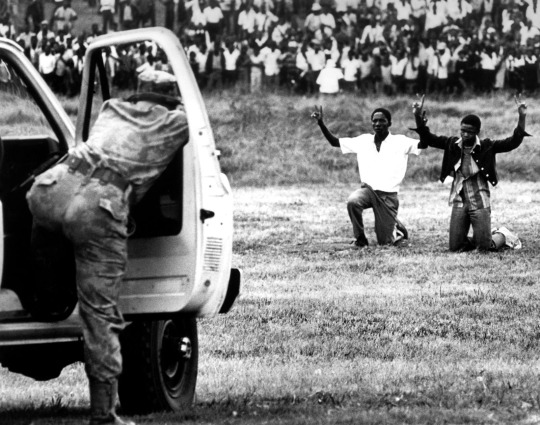
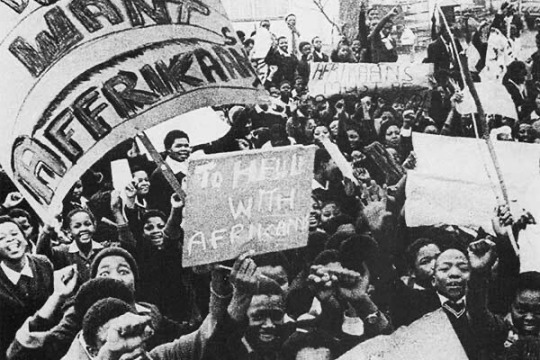
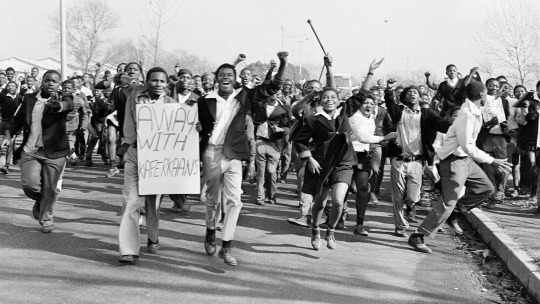
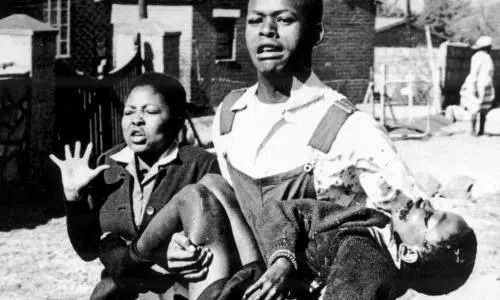
In 1976 the township of Soweto situated in the city of Johannesburg saw a massive uprising whereby thousands of South African students took to the streets to protest against a language rule introduced by the white-minority rule. During the devastating uprising hundreds were killed in the police response but the events would profoundly change the country's social and political landscape.
The the very touching picture of a lifeless 13 year old boy named Hector Pieterson, who had just been shot by the police during the protests was a massive game changer for how the people felt towards apartheid world wide.
The 1976 uprising came after the white dominated South African government decided that black schools could only teach in a language called Afrikaans and English in a 50-50 mix of the languages of instruction within schools. This news had not gone down well with black people as Afrikaans was the language used by the government and many white people within South Africa, for this reason Afrikaans was seen as the language of the oppressor by many black South Africans. What made the new law of even worse was the fact that, while black schools had to provide instruction in both Afrikaans and English as languages, white South African students learned other subjects in their home language.
On June 16th at 7AM thousands of schoolchildren started to protest against the new law, singing songs and waving signs. At first police used gas to try and calm things down, but then started firing guns. The children protesting threw stones back at the police and by then protest had turned into a riot which lasted three days as adults joined in to show their frustration against the language rule change as well as the apartheid movement. By the end of a violent few days of protests, the South African government claimed that 95 people, some of them children, had been killed but in actual fact more than 700 people died during the uprising.
The bloody uprising and the way it was dealt with had brought the massive racial problems in South Africa to the world's attention. Some countries introduced sanctions against South Africa.
•••
En 1976, el municipio de Soweto, situado en la ciudad de Johannesburgo, fue testigo de una rebelión masiva en la cual miles de estudiantes sudafricanos salieron a las calles para protestar contra una regla lingüística introducida por la minoría blanca. Durante la devastadora rebelión cientos de personas murieron a causa de la respuesta policial, pero los acontecimientos cambiarían profundamente el panorama social y político del país.
Una muy conmovedora imagen de un niño sin vida llamado Hector Pieterson, de trece años de edad y quien acababa de recibir un disparo por parte de la policía durante las protestas, fue lo que causó un enorme cambio en la forma en la que se sentía el resto del mundo hacia la segregación racial.
La rebelión de 1976 se produjo después de que el gobierno sudafricano dominado por las personas blancas decidiera que las escuelas negras sólo podían enseñar en un idioma llamado afrikáans e inglés. Esta noticia no fue bien recibida por las personas negras, ya que el afrikáans era el idioma utilizado por el gobierno y muchas personas blancas en Sudáfrica. Por esta razón muchos sudafricanos negros veían el afrikáans como el idioma del opresor. Lo que hizo que la nueva ley fuera aún peor fue el hecho de que, mientras las escuelas negras tenían que impartir lecciones tanto en afrikáans como en inglés, los estudiantes blancos sudafricanos aprendían otras materias en su lengua materna.
El 16 de junio a las siete de la mañana, miles de estudiantes comenzaron a protestar contra la nueva ley, cantando canciones y agitando carteles. Al principio, la policía utilizó gas para intentar calmar la situación, pero luego empezó a disparar. Los niños que protestaban arrojaron piedras a la policía y para entonces la protesta se había convertido en un motín que duró tres días a medida que los adultos se unían para mostrar su frustración contra el cambio de la norma lingüística y la segregación racial. Después de unos días de protestas violentas, el gobierno sudafricano afirmó que 95 personas, algunos de ellos niños, habían sido asesinadas, pero en realidad más de 700 personas murieron durante la rebelión.
La rebelión sangrienta y la forma en la que fue tratada, hizo que el mundo le prestara atención a los enormes problemas raciales en Sudáfrica. Algunos países introdujeron sanciones contra Sudáfrica.
#blacklivesmatter#blacklivesalwaysmatter#english#spanish#blackhistory#history#blackhistorymonth#africanhistory365#africanhistory#soweto#knowyourhistory#historyfacts#blackhistoryyear#black history is world history#black history matters#black history is everybody's history#historia#african history#black history month#south africa#apartheid#students#education#africa#lasvidasnegrasimportan#español#Johana#revolution#share#read
33 notes
·
View notes
Note
Ok I'm sorry but why do native english speakers always refer to € as euro? it's euros omg like 5€ = 5 euros not 5 euro. Euro is the currency, euros is the monetary units. That's like someone saying 30 dollar instead of 30 dollars, for example.
I am a native English speaker technically, but I've lived in the Netherlands for most of my life so there's a caveat. I grew up speaking British English, but now my English has become very Americanized since American English is used internationally more (I almost never use British slang any more for example since nobody understands that shit outside the UK lmao) and obviously there's a big Dutch influence in the way I speak English too (I often speak dunglish more than anything when I'm talking to Dutch speakers)
I think from what I've seen English and American people tend to say "euros" plural, since you'd also say "pounds" and "dollars". I think Irish people often say "euro" singular, but correct me if I'm wrong. So it varies. I think the reason I say "euro" is because of the Dutch influence: in Dutch you'd always say "euro" singular when referring to the price of something. So a Dutch person would absolutely say "5 euro" instead of "5 euros" (I actually just checked my tags on the post where I was talking about currency and I switched back and forth in those tags lmao that's just how it is)
I don't think there's an objectively correct way to say it, and honestly I don't really care if "euro" singular is incorrect lol you understand what I'm saying so I think it's fine
#ask#my accent has changed so much as well. americans often assume I'm south african which is really interesting#i definitely made a conscious effort to lose my regional English accent and turn my accent more American#bc it's harder for non native English speakers to understand things like glottal stops and non rhotic r's#which are common in a lot of British English accents#dutch people are really really good at speaking English but since i was a kid when i moved here and most of my peers were children#with limited English. yeah#although my English accent kinda comes back when I'm talking to other native English speakers.#idk language is so complex and life becomes so much more enjoyable when you understand that linguistics#is meant to be descriptive not prescriptive#also id love to know why you assumed I'm a native English speaker since I'm pretty sure I've never mentioned that here#but i have mentioned living in the Netherlands#actually maybe i have mentioned it lol idk#or maybe you meant to say non native#i mean you weren't technically wrong lmao but I'd love to know where the assumption came from#also i do think it's important to be consistent in more serious contexts. if you're writinga paper or a grant proposal or whatever#then pick one#but idc that i switch back and forth in daily life i can't be overthinking the fucked up way i speak English at this point
2 notes
·
View notes